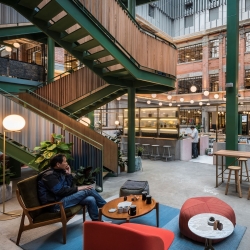To provide the best experiences, we use technologies like cookies to store and/or access device information. Consenting to these technologies will allow us to process data such as browsing behaviour or unique IDs on this site. Not consenting or withdrawing consent, may adversely affect certain features and functions.
The technical storage or access is strictly necessary for the legitimate purpose of enabling the use of a specific service explicitly requested by the subscriber or user, or for the sole purpose of carrying out the transmission of a communication over an electronic communications network.
The technical storage or access is necessary for the legitimate purpose of storing preferences that are not requested by the subscriber or user.
The technical storage or access that is used exclusively for statistical purposes.
The technical storage or access that is used exclusively for anonymous statistical purposes. Without a subpoena, voluntary compliance on the part of your Internet Service Provider, or additional records from a third party, information stored or retrieved for this purpose alone cannot usually be used to identify you.
The technical storage or access is required to create user profiles to send advertising, or to track the user on a website or across several websites for similar marketing purposes.
 Bisley has strengthened its Executive Board team with the appointment of Richard Costin, formerly Commercial Director, to the position of CEO, following the departure of John Atkin in February. (more…)
Bisley has strengthened its Executive Board team with the appointment of Richard Costin, formerly Commercial Director, to the position of CEO, following the departure of John Atkin in February. (more…)












 Rents for new, Grade A office space are likely to rise in many parts of London this year, a property consultancy has predicted. According to
Rents for new, Grade A office space are likely to rise in many parts of London this year, a property consultancy has predicted. According to 
 Nearly six in 10 British workers (58 percent) worry about disappointing their manager, with more than a third (36 percent) saying they rely on praise from their boss to help boost their confidence at work, a survey has claimed.
Nearly six in 10 British workers (58 percent) worry about disappointing their manager, with more than a third (36 percent) saying they rely on praise from their boss to help boost their confidence at work, a survey has claimed. 
 New research has been published aimed at understanding trends, practices and priority areas for improving employees’ experience and creating better places to work. The report,
New research has been published aimed at understanding trends, practices and priority areas for improving employees’ experience and creating better places to work. The report, 
 Communicating a business’s “employee value proposition” or EPV – the package of rewards that it offers in return for the person’s performance at work – is having an increasingly positive impact on employee engagement, retention and recruitment, research has claimed.
Communicating a business’s “employee value proposition” or EPV – the package of rewards that it offers in return for the person’s performance at work – is having an increasingly positive impact on employee engagement, retention and recruitment, research has claimed. 


 Many companies are moving away from long-term overseas placements in favour of short-term transfers, a report has suggested. To reduce costs and meet changing business and worker needs, firms are shifting from typical transfers of one to three years to moves of around three to 12 months,
Many companies are moving away from long-term overseas placements in favour of short-term transfers, a report has suggested. To reduce costs and meet changing business and worker needs, firms are shifting from typical transfers of one to three years to moves of around three to 12 months, 
 Following reports that job applications on the first working Monday of the New Year spiked by 89 percent compared to the average Monday in December, many UK businesses may be missing a trick in their efforts to retain staff, new research has suggested. When researchers commissioned by
Following reports that job applications on the first working Monday of the New Year spiked by 89 percent compared to the average Monday in December, many UK businesses may be missing a trick in their efforts to retain staff, new research has suggested. When researchers commissioned by 
 Artificial intelligence (AI) and emerging technologies such as virtual personal assistants and chatbots will replace 69 percent of managers’ workload by 2024,
Artificial intelligence (AI) and emerging technologies such as virtual personal assistants and chatbots will replace 69 percent of managers’ workload by 2024, 








March 2, 2020
Workers are as important as external stakeholders
by Bianca West • Comment